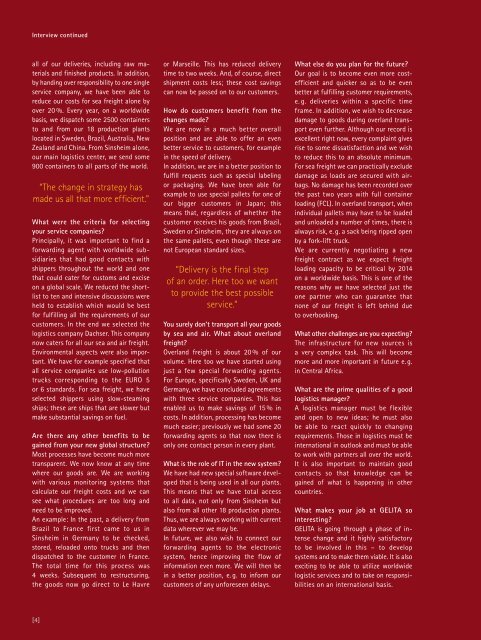Create successful ePaper yourself
Turn your PDF publications into a flip-book with our unique Google optimized e-Paper software.
Interview continued<br />
all of our deliveries, including raw materials<br />
and finished products. In addition,<br />
by handing over responsibility to one single<br />
service company, we have been able to<br />
reduce our costs for sea freight alone by<br />
over 20 %. Every year, on a worldwide<br />
basis, we dispatch some 2500 containers<br />
to and from our 18 production plants<br />
located in Sweden, Brazil, Australia, New<br />
Zealand and China. From Sinsheim alone,<br />
our main logistics center, we send some<br />
900 containers to all parts of the world.<br />
“The change in strategy has<br />
made us all that more efficient.”<br />
What were the criteria for selecting<br />
your service companies?<br />
Principally, it was important to find a<br />
forwarding agent with worldwide subsidiaries<br />
that had good contacts with<br />
shippers throughout the world and one<br />
that could cater for customs and excise<br />
on a global scale. We reduced the shortlist<br />
to ten and intensive discussions were<br />
held to establish which would be best<br />
for fulfilling all the requirements of our<br />
customers. In the end we selected the<br />
logistics company Dachser. This company<br />
now caters for all our sea and air freight.<br />
Environmental aspects were also important.<br />
We have for example specified that<br />
all service companies use lowpollution<br />
trucks corresponding to the EURO 5<br />
or 6 standards. For sea freight, we have<br />
selected shippers using slowsteaming<br />
ships; these are ships that are slower but<br />
make substantial savings on fuel.<br />
Are there any other benefits to be<br />
gained from your new global structure?<br />
Most processes have become much more<br />
transparent. We now know at any time<br />
where our goods are. We are working<br />
with various monitoring systems that<br />
calculate our freight costs and we can<br />
see what procedures are too long and<br />
need to be improved.<br />
An example: In the past, a delivery from<br />
Brazil to France first came to us in<br />
Sinsheim in Germany to be checked,<br />
stored, reloaded onto trucks and then<br />
dispatched to the customer in France.<br />
The total time for this process was<br />
4 weeks. Subsequent to restructuring,<br />
the goods now go direct to Le Havre<br />
[4]<br />
or Marseille. This has reduced delivery<br />
time to two weeks. And, of course, direct<br />
shipment costs less; these cost savings<br />
can now be passed on to our customers.<br />
How do customers benefit from the<br />
changes made?<br />
We are now in a much better overall<br />
position and are able to offer an even<br />
better service to customers, for example<br />
in the speed of delivery.<br />
In addition, we are in a better position to<br />
fulfill requests such as special labeling<br />
or packaging. We have been able for<br />
example to use special pallets for one of<br />
our bigger customers in Japan; this<br />
means that, regardless of whether the<br />
customer receives his goods from Brazil,<br />
Sweden or Sinsheim, they are always on<br />
the same pallets, even though these are<br />
not European standard sizes.<br />
“Delivery is the final step<br />
of an order. Here too we want<br />
to provide the best possible<br />
service.”<br />
You surely don’t transport all your goods<br />
by sea and air. What about overland<br />
freight?<br />
Overland freight is about 20 % of our<br />
volume. Here too we have started using<br />
just a few special forwarding agents.<br />
For Europe, specifically Sweden, UK and<br />
Germany, we have concluded agreements<br />
with three service companies. This has<br />
enabled us to make savings of 15 % in<br />
costs. In addition, processing has become<br />
much easier; previously we had some 20<br />
forwarding agents so that now there is<br />
only one contact person in every plant.<br />
What is the role of IT in the new system?<br />
We have had new special software developed<br />
that is being used in all our plants.<br />
This means that we have total access<br />
to all data, not only from Sinsheim but<br />
also from all other 18 production plants.<br />
Thus, we are always working with current<br />
data wherever we may be.<br />
In future, we also wish to connect our<br />
forwarding agents to the electronic<br />
system, hence improving the flow of<br />
information even more. We will then be<br />
in a better position, e. g. to inform our<br />
customers of any unforeseen delays.<br />
What else do you plan for the future?<br />
Our goal is to become even more cost<br />
efficient and quicker so as to be even<br />
better at fulfilling customer requirements,<br />
e. g. deliveries within a specific time<br />
frame. In addition, we wish to decrease<br />
damage to goods during overland transport<br />
even further. Although our record is<br />
excellent right now, every complaint gives<br />
rise to some dissatisfaction and we wish<br />
to reduce this to an absolute minimum.<br />
For sea freight we can practically exclude<br />
damage as loads are secured with airbags.<br />
No damage has been recorded over<br />
the past two years with full container<br />
loading (FCL). In overland transport, when<br />
individual pallets may have to be loaded<br />
and unloaded a number of times, there is<br />
always risk, e. g. a sack being ripped open<br />
by a forklift truck.<br />
We are currently negotiating a new<br />
freight contract as we expect freight<br />
loading capacity to be critical by 2014<br />
on a worldwide basis. This is one of the<br />
reasons why we have selected just the<br />
one partner who can guarantee that<br />
none of our freight is left behind due<br />
to overbooking.<br />
What other challenges are you expecting?<br />
The infrastructure for new sources is<br />
a very complex task. This will become<br />
more and more important in future e. g.<br />
in Central Africa.<br />
What are the prime qualities of a good<br />
logistics manager?<br />
A logistics manager must be flexible<br />
and open to new ideas; he must also<br />
be able to react quickly to changing<br />
requirements. Those in logistics must be<br />
international in outlook and must be able<br />
to work with partners all over the world.<br />
It is also important to maintain good<br />
contacts so that knowledge can be<br />
gained of what is happening in other<br />
countries.<br />
What makes your job at GELITA so<br />
interesting?<br />
GELITA is going through a phase of intense<br />
change and it highly satisfactory<br />
to be involved in this – to develop<br />
systems and to make them viable. It is also<br />
exciting to be able to utilize worldwide<br />
logistic services and to take on responsibilities<br />
on an international basis.
















